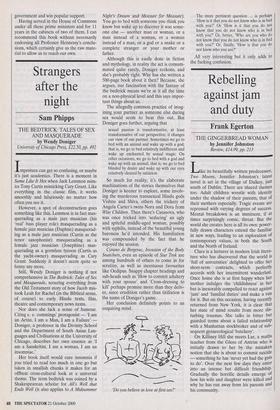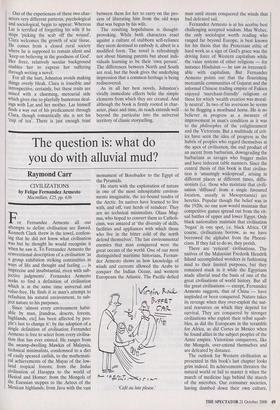Rebelling against jam and duty
Frank Egerton
THE GINGERBREAD WOMAN by Jennifer Johnston Review, £14.99, pp. 213 Like its beautifully written predecessor, Two Moons, Jennifer Johnston's latest novel is set in the village of Dalkey, just south of Dublin. There are shared themes too. Adult children wrestle with identity under the shadow of their parents, that of their mothers especially. Tragic events are repressed with varying degrees of success. Mental breakdown is an imminent, if at times surprisingly comic, threat. But the world she creates here is all its own: power- fully drawn characters extend the familiar in new ways, leading to an exploration of contemporary values, in both the South and the North of Ireland.
Clara is a lecturer in modern Irish litera- ture who has discovered that the world is `full of universities' delighted to offer her short-term contracts, which perfectly accords with her intermittent wanderlust. Once home she is at first happy when her mother indulges the 'childishness' in her but is inexorably compelled to react against `jam' and 'familial duties' and make a run for it. But on this occasion, having recently returned from New York, it is clear that her state of mind results from more dis- turbing traumas. She talks in bitter but guarded terms about a failed relationship with a Manhattan stockbroker and of sub- sequent gynaecological 'butchery'. On Killiney Hill she meets Lar, a maths teacher from the Glens of Antrim who is initially drawn to her by the mistaken notion that she is about to commit suicide — something he has 'never yet had the guts to do'. Over the next few days they enter into an intense but difficult friendship. Gradually the horrific details emerge of how his wife and daughter were killed and why he has run away from his parents and his community. Out of the experiences of these two char- acters very different patterns, psychological and sociological, begin to appear. Whereas Lar is terrified of forgetting his wife if he stops 'picking the scab off the wound', Clara welcomes the growth of scar tissue. He comes from a closed rural society where he is supposed to remain silent and `keep on believing in the goodness of God'. Her freer, relatively secular background enables her to express her suffering through writing a novel.
For all the hurt, Johnston avoids making things overly bleak. Clara is irascible and introspective, certainly, but these traits are mixed with a charming, mercurial side which gives rise to playfully humorous deal- ings with Lar and her mother. Lar himself finds a way out of his predicament through Clara, though romantically she is not his `cup of tea'. There is just enough trust between them for her to carry on the pro- cess of liberating him from the old ways that was begun by his wife.
The resulting hopefulness is thought- provoking. While both characters react against a culture of stubborn self-reliance they seem destined to embody it, albeit in a modified form. The novel is refreshingly not about blaming parents but about indi- viduals learning to be their 'own person'. The differences between North and South are real, but the book gives the underlying impression that a common heritage is being rediscovered.
As in all her best novels, Johnston's vividly immediate effects belie the simple elements from which they are created. And although the book is firmly rooted in char- acter, place and time, its reach extends well beyond the particular into the universal territory of classic storytelling.


























































































 Previous page
Previous page